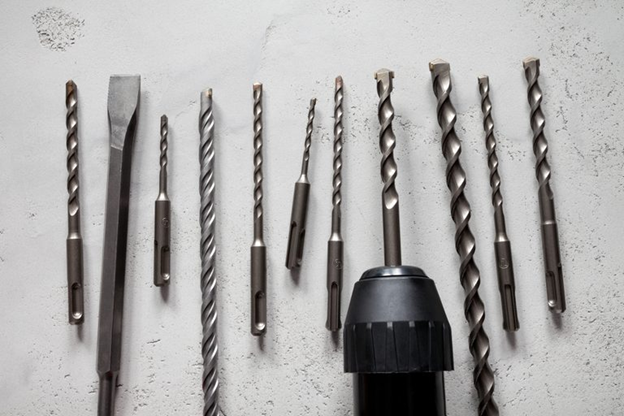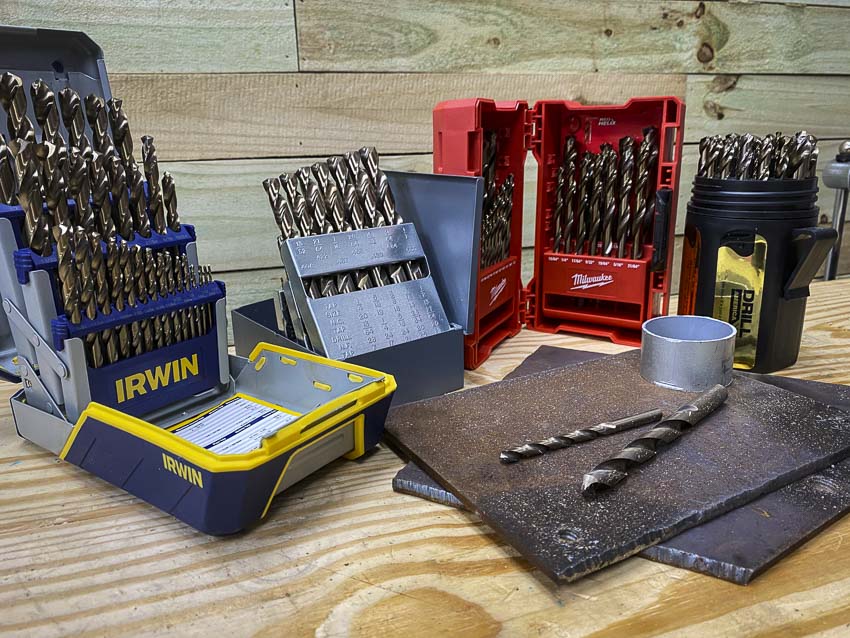Types of Drill Bits for Metal – Drill bits for metals are the most costly since drilling through steel is not a common home repair task. You need a heavy-duty, hard drill bit to bore through steel. Titanium and cobalt drill bits are both reliable options for metalworking.
On the Linquip website, among the many options available to you, you will find all the information you need to know about the Drill Bits, as well as information regarding this marketplace. You can count on Linquip to provide you with as much general and reliable information about this topic, whether you’re a professional or a customer looking for a proper company. We recommend you review a list of all Drill Bits Products available in Linquip. You can also be encouraged to visit Drill Bits for Sale and find the most suitable device based on your applications and demands.
What Is a Drill Bit?
An ordinary drill bit is a rotary cutting tool used to create holes. While the point of the bit makes contact with the material being drilled, the shank, or the other end, is held in place by the jaws of a drill chuck.
You could fill an entire aisle at a hardware shop with the various sizes and designs of drill bits. We will be concentrating on the most popular ones for home improvement tasks.

The primary function of a drill bit is to bore uniformly sized holes in various materials, most notably drywall, wood, metal, and masonry. They may drill a hole for a screw or nail, or make a channel to run wire through. Drill bits can be purchased singly or in multi-size sets known as drill indices.
Think about the form of the bit, the substance it’s made of, and the work material you’ll be drilling into before settling on a drill.
Various Types of Drill Bits Based on the Physical Shape
When choosing a drill bit, its physical form is the most important consideration.
Twist Bit
Most likely due to its versatility, the twist bit (also known as a fluted bit) is the most often used variety of drill bit.
The flutes, or spiraling grooves, that run the length of a twist bit are what give it its name. The flutes on a drill bit help to remove debris as it cuts through the work material. When drilling a hole, twist bits are the tool of choice. Many types of drill bits, such as brad bits and masonry bits, are only variants on the design of the standard twist bit.
However, there is a size limit beyond which the weight and heat of twist bits make their use impracticable. Holes of a diameter of up to an inch may typically be drilled successfully using a twist bit. Spade bits and hole saws are needed for holes bigger than an inch.
Spade Bit
A spade bit is shaped like a flattened bat with a sharp tip in the middle and two wings of material protruding from its sides. With a spade bit, you can cut out a significant chunk of the target material.
The point keeps the bit from gliding, while the wings’ pointed tips score the outer rim of the circular, chipping away at it as the spades cut in. Since the spade bit cuts through wood with a scoring action, it causes less tear-out.
Hole Saw
The material removed by a hole saw is likewise substantial. The hollow core is not removed, however; rather, the outer diameter is sliced using a twist bit located in the core’s center. What’s left is a central disk or core of substance.
Step bit
A step bit can replace a number of standard drill bits. These are not round like a normal cylinder, but rather have a stair-step profile and seem more like a cone. In this case, each “step” corresponds to a drill size increase. You may use this to drill a hole of a specific width, or to drill several holes of varying widths without having to switch out the drill bit.

Various Types of Drill Bits Based on the Material
Many different materials are used to make drill bits. What follows is more appropriate for the everyday do-it-yourselfer (and in their price range.)
High-Carbon Steel
These steel drill bits may be used on a variety of materials, including wood, plastic, and metal. The negative is that they can become brittle and dull if used at too high of a drill speed. This occurs frequently while drilling into metal.
High-Speed Steel
Bits made of high-speed steel (HSS) can keep drilling for hours without dulling. When cutting drywall or wood, they are virtually as effective as high-carbon steel bits, but when drilling into metal, they really shine. Whenever possible, choose a drill bit made from high-speed steel (HSS) over one made from carbon steel if the price difference is negligible.
Carbide or Carbide-Tipped
Carbide or carbide-coated drill bits have a far longer lifespan than standard steel drill bits, but come at a much higher price. DIYers seldom have a need for the greater durability provided by carbide-tipped drill bits. If you decide to use one, it’s probably best to keep it for the harder stuff and stick with a standard bit for anything else. Although they should be replaced when they become dull, carbide drill bits may be easily resharpened.
Coatings
Some components have extra-long-lasting coatings or are heat- and corrosion-resistant. Titanium and even diamond dust are among these materials.

Which Drill Bits To Choose
You need to think about a few things before settling on a metal drill bit.
Important considerations include:
First, The Kind Of Metal You’re Drilling Into
Sometimes, you just can’t be sure what metal you’re drilling into. Even so, it’s a good idea to make an effort to determine this, since doing so might keep you from having to buy more drill bits or a drill set than necessary. However, if you are aware that you will be drilling stainless steel, you will know that you will likely require a high-quality set of cobalt drill bits or better.
Second, What Kind Of Drill Are You Using?
When utilizing a pedestal drill in a workshop, you will have complete command over the drill’s steadiness, precision, and, in all likelihood, rate of rotation. Your anxiety about damaging high-priced drill bits like 8% cobalt or Carbide should decrease as a result.
Your budget and anticipated frequency of usage for the metal drill bit(s) are two other apparent considerations.
Drill Bit Maintenance
After you invest in drill bits, there are steps you can do to keep them in good condition for as long as possible. When following these instructions, you should have no problems with your drill bits breaking.
- When drilling metal, you should always use a metal cutting paste or lubricant.
- If you’re not sure what the recommended drilling speed is, go slow.
- Apply only the minimum amount of force needed
- Make small, frequent stops when drilling.
All of these precautions are taken to avoid damaging the drill bit from overheating.
FAQs about Types of Drill Bits for Metal
Exactly which drill bit is ideal for metal?
To drill through metal, a special, hard drill bit is required. Titanium and cobalt drill bits are the best options for drilling through metal.
What is a cobalt drill bit?
The cobalt in cobalt drill bits comes from the cobalt steel they are constructed of. There is no need to replace them with titanium drill bits; rather, they may be resharpened. Cobalt drill bits can easily cut through tough materials like cast iron, stainless steel, and titanium due to their great hardness, resistance to heat, and abrasiveness.
Can you tell if a drill bit is meant for metal by its shape?
In most cases, black drill bits are used for metal drilling. If you’re buying a brand-new one, look at the label to see if it’s made of tungsten carbide, cobalt, or titanium. Looking for a sharp point on the end of them is another quick method to tell them apart from standard drill bits.
What about using metal drill bits on wood?
The type of wood and the drill bit will determine whether metal drill bits may be used. When drilling into wood, most metal drill bits enhance splintering and tear-out. Titanium drill bits, on the other hand, work well in most cases.
Which is more durable: drill bits made of cobalt or titanium?
Titanium drill bits are much harder than cobalt, but since they are coated rather than pure titanium, they cannot be sharpened.
Conclusion
You may acquire all the details you want about the Drill Bits and details about this market on the Linquip website, one of the numerous possibilities available to you. Whether you’re a professional or a client seeking for a reputable business, you can rely on Linquip to give you as much basic and trustworthy information on this subject. We advise you to look through the whole range of Drill Bits Experts and take advice from our professionals. If you need any services required for your product, you can count on Linquip and visit Drill Bits Services.
Download PDF for Types of Drill Bits for Metal
You can download the PDF format of this post from the link provided here.
Buy Equipment or Ask for a Service
By using Linquip RFQ Service, you can expect to receive quotations from various suppliers across multiple industries and regions.
Click Here to Request a Quotation From Suppliers and Service Providers
Read More on Linquip
- 13 Types of Adjustable Wrench: Clear Guide
- 6 Types of Hammer Drills with Advantages
- 12 Types of Industrial Sewing Machine + Advantages
- 5 Different Types of Drill Bits for Wood: A Comprehensive Guide
- The 8 Best Cordless Drills + Buying Guide
- 3 Types of Crimping Tools + Name & Their Uses
- 33 Types of Pliers & Their Names: A Comprehensive Explanation
- 27 Types of Screwdrivers + Names (Comprehensive Guide)
- 17 Types of Hinges and Hinge Materials: A Complete Guide
- Types of Electrical Wire + Application (Complete Guide)
- 9 Types of Pop Rivet + Working Principle (Clear Guide)
- 28 Types of Clamps: A Complete Guide
- 8 Types of O-Ring + Applications (Clear Guide)
- All 24 Types of Drill Bits + Video: Clear Guide
- Different Types of Bolt Heads + Benefit of Bolts and Nuts
- Different 5 Types of Fasteners: A Practical Guide
- 7 Types of Masonry Drill Bits + Applications & Features



